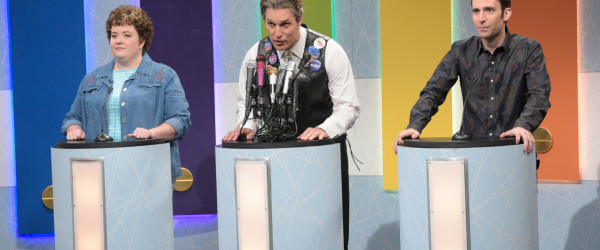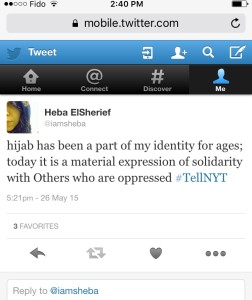In a recently aired Saturday Night Live skit, comedian Kenan Thompson played host to a gameshow called Should You Chime in on this? In it, contestants (caricatured as having little intellect and even less of a personal connection to the topics presented) had to refrain from weighing in on recent news items. Even when knowing that the answer to whether or not to add their opinions is always “no” and even when there is a promise of great wealth if they can keep silent, contestants cannot refrain from trying to add their thoughts to the topics presented. Satire, of course, works by allegorically representing human ills so that audiences may see the foolishness in them. Kenan and the SNL writers were picking up on a phenomenon that I see splattered over my timelines and newsfeeds all the time – everyone and his brother or sister has to add their “2 cents” to every and all issues viral at the moment. Sometimes, it’s hard to refrain from speaking our opinions on matters that those around us are talking about.
We live in an age of collapsed ideas of what we previously understood journalism to be. How many of us will turn to Twitter, for instance, to see what’s trending rather than waiting for the 6 pm news? When was the last time we bought a newspaper to follow, in print form, a favourite columnist’s weekly articles? Only a few years ago, “citizen journalism” – in the form of CNN’s ireport, for example, was a novelty. One might think that the proliferation of voices, of having the opportunity to contribute to news and comment on events, would be a good thing. We can hear non-mainstream speakers today in ways we couldn’t have done in traditional journalism. Alternate media sources exist; watchdog journalistic organizations have exposed important realities; and what would we do without fake news productions like The Daily Show?
But something important, I think, was lost too: the ability for some of us consumers (and I choose that word purposefully) to filter our responses – to think before we speak (or post) about matters on which we are not entirely informed. For the sake of our followers and friends, page likers and hater/stalkers, online presences’ must weigh in – must have a critique or an opinion or a counter point – on things that all people in our virtual worlds seem to be talking about. Case in point: this article.
This article started as a response to the recent “controversy” over the Washington Post piece by Asra Q. Nomani and Hala Arafi: As Muslim women, we actually ask you not to wear the hijab in the name of interfaith solidarity. In an earlier draft of this article, I might have talked about my own relationship to the hijab as a Muslim woman (because I wouldn’t ever purport to speak on behalf of other women).
As an aside: a while back, I tweeted, in response to a call from the I’d been thinking about how the hijab has meant different things to me at different times in my life and how mediums like Twitter and Facebook and the likes have collapsed traditional notions of journalism by giving alternate voices the semblance of platform. For me, it’s meant that I have more awareness about the plight of others that I wasn’t so aware of before. I thought that my hijab, as a marker of my otherness, could be a material expression of solidarity with others – unjustly treated and marked by their difference too.
So, in an earlier draft, I might have gone into detail about my own views and experiences of hijab. I might have conducted research on the history and context of women’s covering in Islamic law (but that might read like an academic literature review and require a “works cited” list). Certainly, my article would have aspired to attend to the counterpoints and open letters in response to the original piece, like this one from Keziah Ridgeway: A response to Asra Nomani and Hala Arafa or this one from Saba Syed: This Muslim Woman Asks You Not to Undermine Hijab or this one from Mariam Durrani: Feminist Critics of Wearing Hijab in Solidarity Fall Into Same Old Traps.
To express respect for Nomani and Arafa’s practice of writing their thoughts and writing back to patriarchal oppression, my article would have attempted to find value in their points and would have aimed for some sort of invitation for further dialogical exchange. My article would NOT have cited any male reaction to the piece, mostly because as much as some of them may have tried to act as allies (either for or against), I’m not particularly interested in hearing their opinions on something that doesn’t really concern them. Hijab agency should be in the hands of women and if I were to link to this male or that male’s take on it, I might feel like I’d be perpetuating the widely-held (but erroneous) notion that Muslim women wear the hijab because… Muslim men.
Come to think of it, my article might have talked about Muslim males chiming in on this as being akin to Matthew McConaughey’s character in the SNL skit . Heck, writing this article might have reminded me about a video last year (shared WAY too many times on my timeline) in which two prominent young Muslim men comment and “watch over” as non-Muslim women come to their booth to try on the hijab. And remembering just how terrible that video was in how it enacted yet another manifestation of the male gaze might have even prompted me to find some affinity – if not complete agreement – with the call that Nomani and Arafi put out to non-Muslim women donning the hijab in solidarity. Yet, as my earlier draft of this article might have concluded, the point of solidarity is what is most salient for me. It even makes me think beyond the all-important questions of why, with all the other crises and controversies we’re living through, the world (or at least the one in my timeline and feeds) is still so obsessed with what women are or are not wearing.
So, even as this article started as a response to the Nomani and Arafa piece, it ends with the ironic (and ignored) realization that I should not have chimed in at all. As of today, the original article has nearly 1100 comments – I haven’t read any of them because I imagine that they would all remind of me contestants in that SNL skit. In a day when there are plenty of social justice issues that demand our time and activism, discussion about what a women does or does not wear on her head are distractions. In a day when opinion page articles are regularly (mis)taken for journalism, initiating conversations that makes our thoughts spin around in circles, rather than moving forward on issues that need us to focus on finding solutions, is unconscionable. Instead, let’s talk about how we can use our voices to protect others and stand in solidarity with those who need us.
Header image source




